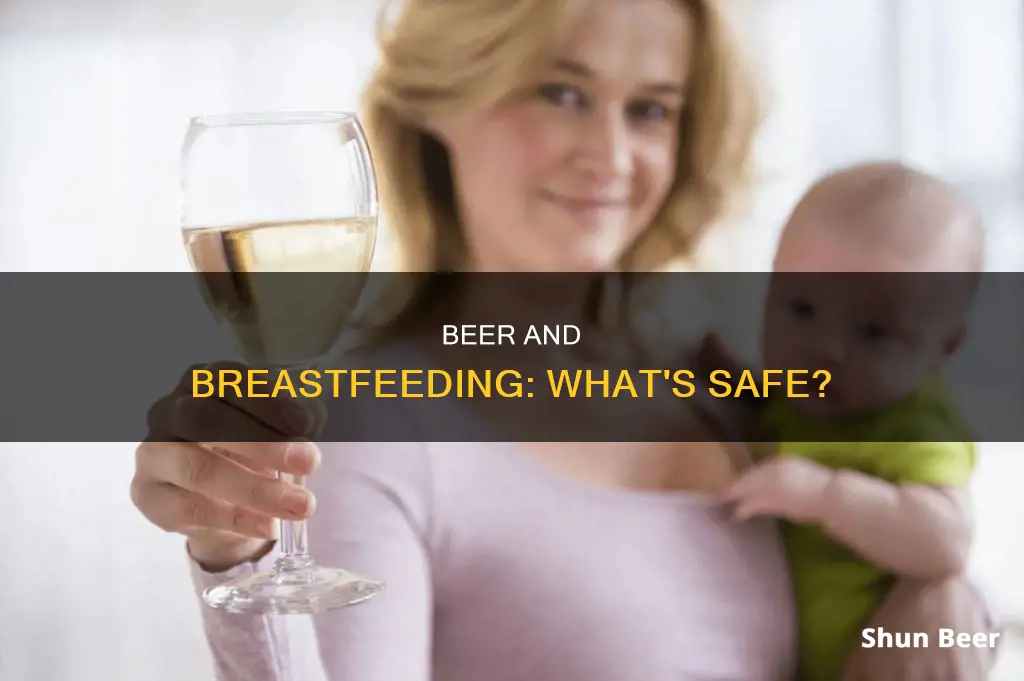
It is not advisable to consume alcohol while breastfeeding. The safest option is to abstain from drinking altogether. However, if you do choose to drink, it is important to wait until the alcohol has left your breast milk before nursing your baby. The time it takes for alcohol to leave breast milk depends on various factors, including the amount consumed, the time taken to consume it, whether it was consumed with food, and individual variations in alcohol absorption and metabolism. Generally, it is recommended to wait at least two hours after drinking one standard drink before breastfeeding.
Alcohol passes freely from a mother's bloodstream into her breast milk, and the amount of alcohol ingested by the baby is estimated to be 5% to 6% of the weight-adjusted maternal dose. Excessive alcohol consumption can disrupt a baby's sleep patterns and growth and may have long-term implications for their development. Additionally, alcohol can affect the hormones that control breast milk production and reduce supply.
| Characteristics | Values |
|---|---|
| Can alcohol be consumed while breastfeeding? | Yes, but only occasionally and in moderation. |
| How much alcohol can be consumed while breastfeeding? | No more than 1-2 drinks per week. |
| How long after drinking alcohol can a mother breastfeed? | 2 hours per drink consumed. |
| Does alcohol increase milk production? | No, it has been shown to inhibit let-down and decrease milk production. |
| Does alcohol remain in breast milk? | Alcohol is not trapped in breast milk. It rises and falls with the amount of alcohol in the mother's blood. |
| Does drinking alcohol while breastfeeding harm the baby? | Drinking occasionally has not been proven to be harmful. However, drinking regularly or heavily may affect the baby's sleep, growth and development. |
What You'll Learn

Occasional light drinking while breastfeeding
Alcohol passes freely and quickly from your bloodstream into your milk. The concentration of alcohol in your milk is similar to the concentration in your blood and is usually highest about 30 to 60 minutes after drinking. The more you drink, the longer alcohol stays in your bloodstream and milk, and the higher the concentration becomes.
If you have one drink, most of the alcohol should be out of your system in about two to three hours, although this can vary depending on factors such as your weight, body composition, and how quickly you drink.
There is no need to pump and dump after drinking alcohol, as this will not speed up the elimination of alcohol from your milk. Instead, you can nurse your baby right before having a drink and then wait two to three hours (for a single drink) before nursing your baby again.
It is crucial to plan ahead to ensure safe sleeping arrangements for your baby if you have been drinking alcohol. Mothers who have been drinking alcohol should never bed-share with their babies, as drinking affects your natural reflexes, and drinking and bed-sharing has an increased association with sudden infant death syndrome (SIDS).
Studies have shown that alcohol can affect the balance of hormones that control breast milk production and can reduce your supply. Moderate consumption can reduce oxytocin levels, affecting milk supply and let-down.
While occasional light drinking while breastfeeding is generally considered safe, drinking regularly or heavily may affect your milk supply, make your baby sleepy, or affect their growth and development.
Beer Drinkers and Kidney Donors: Is it Possible?
You may want to see also

Alcohol and breast milk supply
It is important to note that there is limited data on the effects of alcohol consumption on breastfeeding women and their infants. However, here is some information on alcohol and breast milk supply:
- Alcohol passes freely and quickly from the mother's bloodstream into her milk. Therefore, the concentration of alcohol in the milk is similar to that in the blood.
- The amount of alcohol in breast milk is usually highest around 30 to 60 minutes after consuming an alcoholic beverage. However, this can be delayed if the drink is consumed with food.
- The more alcohol a mother consumes, the longer it stays in her bloodstream and milk, and the higher the concentration becomes.
- Studies have shown that alcohol decreases milk production. In particular, having two or more drinks has been shown to decrease the milk ejection reflex of nursing mothers.
- The American Academy of Pediatrics recommends that alcohol intake by a breastfeeding mother should be occasional and limited to a moderate amount of alcohol at one time.
- The Motherisk program in Toronto, Canada, has issued more conservative recommendations, stating that there are no known benefits of exposing nursing infants to alcohol, and that it is prudent for mothers to delay breastfeeding until alcohol is completely cleared from their breast milk.
- The Academy of Breastfeeding Medicine states that consuming alcohol during lactation has several negative effects, ranging from mild to severe, depending on the amount of alcohol consumed and other factors related to how quickly the mother's body processes alcohol.
- The World Health Organization states that there is no safe level of alcohol consumption for anyone, including breastfeeding mothers.
Dialysis and Alcohol: Can You Drink Beer Safely?
You may want to see also

Pumping and dumping after drinking alcohol
Pumping and dumping breast milk after drinking alcohol is not necessary to get rid of alcohol in your system. Alcohol leaves your breast milk when it leaves your bloodstream. However, pumping and dumping may be helpful to prevent your breasts from becoming engorged and to dispose of milk that may still contain alcohol.
If you are a casual drinker, having a glass of alcohol one or two times a week, there is no need to pump and dump. It is recommended to wait at least two hours after drinking alcohol before breastfeeding or pumping again. This allows your body time to metabolise most of the alcohol before the next feeding or pumping session.
If you are drinking more heavily, it is important to wait until the alcohol has cleared your system before breastfeeding again. Pumping and dumping can be done for comfort if your breasts feel too full, but it will not speed up the rate of alcohol elimination from your body.
The amount of time it takes for alcohol to clear your system depends on various factors, including how much you drink, your weight, and your body composition. As a general guideline, alcohol from one drink can be detected in breast milk for about two to three hours, while alcohol from two drinks can be detected for about four to five hours.
It is important to note that drinking alcohol while breastfeeding may have some effects on your baby. Studies have shown that infants may consume up to 20% less milk in the hours after maternal alcohol consumption. Additionally, alcohol can change the taste of your milk, making it less desirable to your baby. Regular and heavy consumption of alcohol can also decrease your milk supply and have potential long-term effects on your baby's development.
Beer and Painkillers: How Does Ibu Work?
You may want to see also

Effects of alcohol on the baby
The effects of alcohol on a baby are directly related to the amount of alcohol consumed by the breastfeeding mother. Occasional drinking or limiting alcohol consumption to one drink per day has not been proven to be harmful to the baby. However, drinking more than this can affect the baby in several ways.
Firstly, alcohol can cause drowsiness, deep sleep, weakness, and abnormal weight gain in the infant. It can also disrupt the baby's sleep patterns, causing them to sleep less than average. Secondly, alcohol inhibits the release of oxytocin, which stimulates the milk ejection reflex. This can lead to a decrease in milk supply and the baby's milk intake. Thirdly, alcohol can affect the baby's motor development and cognitive development, including a possible impairment of abstract reasoning at school age (6-7 years). Finally, excessive drinking by the mother can result in slow weight gain or failure to thrive in the baby.
It is important to note that the long-term effects of alcohol exposure through breastfeeding are still unknown, and more research is needed in this area. However, the current evidence suggests that drinking in moderation while breastfeeding is unlikely to cause harm to the baby.
Bottoms Up Beer Dispensers: How Do They Work?
You may want to see also

Long-term effects of drinking alcohol while breastfeeding
While the short-term effects of drinking alcohol while breastfeeding are well-documented, the long-term effects are less clear.
A 2013 review of 41 studies on drinking alcohol while breastfeeding concluded that the long-term effects of alcohol exposure through breastfeeding are not yet known. However, the review indicated that if a breastfeeding mother doesn't exceed the amount of alcohol considered safe for all women (one drink per day), her baby shouldn't be exposed to enough alcohol to cause harm.
In a 2018 study, researchers found a connection between mothers who drank while breastfeeding and lower cognitive scores in their children when they were 6 to 7 years old. However, more research is needed to determine if the impact on brain development is due to the alcohol itself or the resulting disruption in sleeping and eating patterns.
Another study found that the motor development of infants exposed to alcohol in breast milk was decreased or delayed. The more alcohol the infants consumed through breast milk, the lower they scored on motor development indices.
Additionally, concerns about negative effects on an infant's developing brain are based on animal research. This research suggests that alcohol may be toxic to the developing brain, especially during periods of rapid brain development in the first year after birth. Impairments to memory and inhibitory responses may also occur as a result of an infant's consumption of alcohol.
Overall, while there is some research on the long-term effects of drinking alcohol while breastfeeding, more studies are needed to fully understand the potential impact on children's development.
Weight Watchers and Beer: What You Need to Know
You may want to see also
Frequently asked questions
Most healthcare professionals agree that drinking small amounts of alcohol while breastfeeding is unlikely to harm your baby. However, opinions vary over the amount of alcohol that is considered safe. The American Academy of Pediatrics recommends that alcohol intake be limited to an occasional intake of no more than 0.5 g of alcohol per kg of body weight, which for a 60 kg mother is approximately 2 oz of liquor, 8 oz of wine, or 2 beers. Other sources suggest that moderate consumption for women—defined as up to 1 drink per day—is safe and will not harm the infant.
It is recommended to wait at least 2 hours after drinking beer before breastfeeding your baby. The more drinks you have, the longer it takes for your body to clear the alcohol from your system. Alcohol can typically be detected in breast milk for about 2 to 3 hours after a single drink, but this can vary depending on various factors such as how fast it is consumed, whether it is consumed with food, the mother's body weight, and individual variations in alcohol absorption and metabolism.
Studies have shown that alcohol can affect the balance of hormones that control breast milk production (prolactin and oxytocin) and can reduce milk supply. Alcohol itself hinders both the milk ejection reflex and milk production, especially when consumed in large amounts. Even a small amount, such as a single beer or glass of wine, can disrupt the balance of milk-producing hormones in breastfeeding women.







